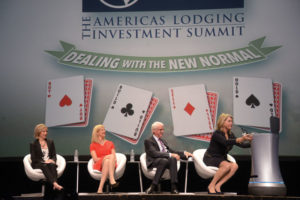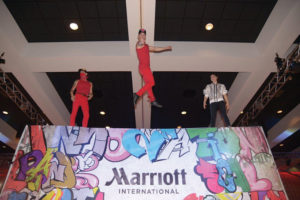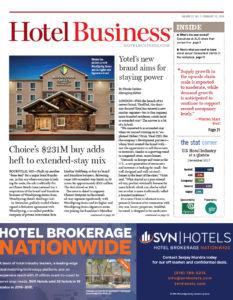LOS ANGELES—Hoteliers converged at Americas Lodging Investment Summit (ALIS) last month to discuss what the “new normal” means, how it will shape transactions and why dealing with it is necessary for success.
Baird Equity Research met with owners, operators, brokers, developers and private equity at ALIS to get a better understanding of the “new normal.” What the firm found during its discussions and meetings is that fundamental outlooks have improved; acquisition appetite remains high; and the market as it stands is a sellers’ market. On the opposite end of the scale, upside expectations remain relatively tempered; fewer deals are available on the market; and there’s an uptick in capital chasing properties’ higher yields.
“Slow-but-steady growth is the ‘new normal,’” said Michael Bellisario, VP, senior research analyst at the firm. “This cycle has been longer than the average cycle; macroeconomic trends are very positive, yet RevPAR growth remains sluggish; and industry-wide RevPAR growth in the 2-3% this late in a cycle makes investors nervous—usually RevPAR is either accelerating or decelerating throughout the cycle. Everyone is waiting for an inflection.”
Going into ALIS, the analysts anticipated a different vibe from attendees. While the overwhelming responses to the research firm’s questions weren’t necessarily negative, they also weren’t too enthusiastic about the market.
“We had been expecting more optimism from industry participants at the conference,” he said. “Everyone appears to be upbeat about the near-to-intermediate term growth prospects for the industry, but we would describe the level of enthusiasm as tempered, and most expect the slow-but-steady environment to continue, which is an encouraging sign from a sentiment standpoint, in our view.”
Slowing RevPAR growth and rising operations costs are causing some industry executives to reconsider strategy. “The new normal is smarter operations and doing more with less,” said Justin Jabara, VP of development and acquisitions at Meyer Jabara Hotels, a Danbury, CT-based management company.
Others within the industry consider the new norm more broadly. “I think the new normal had been lower growth in the United States, and that’s been the case for eight, nine years, but what we’re seeing is a change in that new normal, and that growth has really started to accelerate again,” said Monty Bennett, CEO of Dallas-based Ashford. “The new normal, for me, had been low growth for a long time, but it seems like we’re coming out of that into a high growth. So I guess, for me, the new, new normal is back to the old times of some great growth—so let’s hope that it happens.”
For some, the new normal isn’t so new. “It’s just the same as the old normal in the sense that you have to execute on the fundamentals every day—that part hasn’t changed,” said Greg Steinhauer, president of American Life Inc., a Seattle-based real estate development and investment company. “You have a lot of supply coming into these markets, and it’s questionable as an industry how many more hotels we really need, depending on whom you talk to. Of course, that’s location specific, right?” Additionally, the executive acknowledged the industry’s labor shortage being part of the new normal.
Two of his company’s major pain points in today’s market are the “availability of workforce and the increase in costs and construction,” Steinhauer said. Both are ongoing concerns for many in the investment community.
“I think what’s most impactful to our industry is labor—the cost of labor, the cost of construction,” said Lynne Roberts, SVP of development & capital markets at Aimbridge Hospitality, a Plano, TX-based hotel management company.
The new normal is just the “worsening of the old normal,” said Larry J. Spelts, president and chief development officer of Expotel Hospitality, a New Orleans-based management company. As a reaction to the last administration, the political divide continues to widen—mainly due to the increase of ideologically driven policymaking at the highest of levels.
“The result is that the new policies that have been enacted currently have very little support [among]moderates of both parties, or the so-called ‘mainstream,’” he continued. “Given the volatile mood of the electorate, it seems probable that there soon will be a change of control in Congress, so it is nearly impossible to plan for anything except for whatever is being done now to be undone.”
Still, there are other industry executives who believe customers will continue to do what they do best—spend, and in lodging, which means more travel.
“We have reached a new baseline of travel volume, and that is just in the hotel industry per se, even before one reaches the volumes achieved by Airbnb,” said William H. Reynolds Jr., senior managing director of MCS Capital LLC, a subsidiary of The Marcus Corporation. “Naturally, there will be recessionary periods, but driven by the economy at large versus overbuilding in our industry in general. Inbound foreign travel to the U.S. will also continue to increase over the long term, which bodes well for our owners.
“Despite the huge volumes of capital, available data and analytic capabilities appear to have provided a balancing effect on decision making about investments, especially new-construction,” he said. HB
Check out our video interviews at video.hotelbusiness.com




